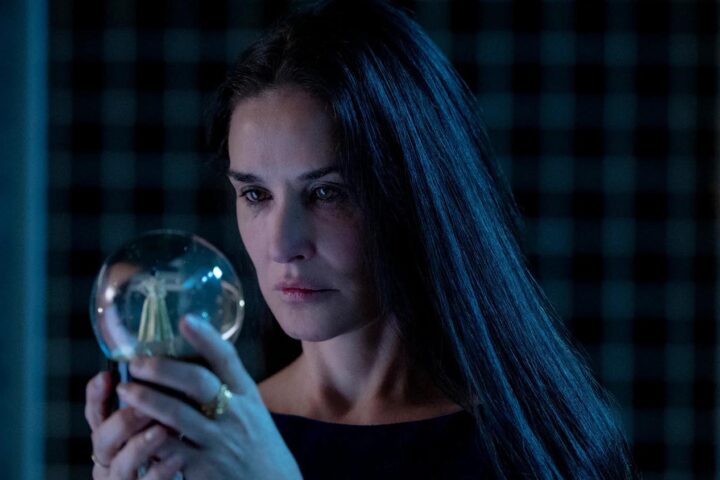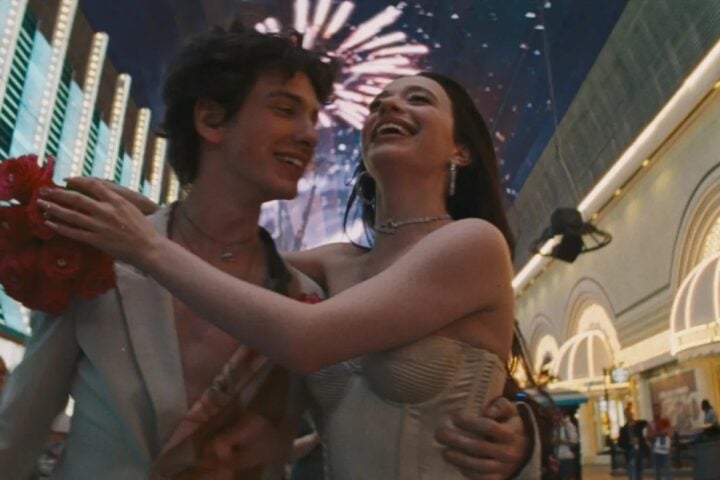Shot in radiant black and white and set in post-World War II Rome, Paola Cortellesi’s There’s Still Tomorrow is a darkly comedic drama about the experiences of one woman, Delia Santucci (Cortellesi), trapped in an abusive marriage. It’s a film about domestic violence that, while clearly intended as an homage to Italian neorealism, finds levity through choreographed musical numbers and moments of light magical realism.
The story begins with Delia’s husband, Ivano (Valerio Mastandrea), slapping her after she wishes him a good morning inside the cramped apartment they share with their children and Ivano’s bedridden father, Ottorino (Giorgio Colangeli). We see from the onset that Delia is treated like a maid, as she gets scolded by Ivano and Ottorino for her domestic shortcomings. Through it all, Marcella (Romana Maggiora Vergano), Delia’s teenage daughter, resents her mother’s helplessness. Set to a nostalgic song about Delia’s daily routine, this opening sets the tone of the film’s depiction of the patriarchal tyranny that this woman must endure.
There’s Still Tomorrow offers glimpses of familiar patterns of marital abuse, namely in the way that Ivano pivots on a dime from gentle regret to red-hot anger toward Delia. But the film isn’t interested in depicting the personal nuances of their relationship, working in broad strokes instead to explore the effects of marital abuse and the larger society that tolerates it.
The most interesting relationships here are those among women, particularly the one between Delia and Marcella, who feels an almost venomous pity for her mother. Cortellesi, who channels Delia’s quiet confidence with a weary composure and a defiance in her eyes, is at her most poignant when her character is at the receiving end of Marcella’s angsty tirades. “Where do I go?” she mutters when asked why she doesn’t just run away from the abuse. Marcella simply can’t fathom the extent to which her mother has been abused, nor does she intuit what Delia won’t tell her: that she’s the reason why her mother has chosen to stay with her father.
Things begin to look up for Delia after Marcella becomes engaged to Giulio (Francesco Centorame), son of local café owners enriched by their dealings with Nazis during the occupation of Rome. Around the same time, a mysterious letter arrives that details a possible way for Delia to escape from the clutches of Ivano. Suddenly, Delia sheds her passivity and There’s Still Tomorrow begins to offer a hopeful, and at times funny, catharsis, as in the way Delia’s mad-dash escape for a day away from Ivano invites comparison to a prison break.
Despite its warm and whimsical snapshots of daily life in Rome, There’s Still Tomorrow understands that abuse against women is the result of a dark, entrenched patriarchal culture. There comes a point here where Delia suspects that the marriage Marcella is entering into is about to become like hers, and tries to sabotage Marcella and Giulio’s relationship at any cost. Delia’s life, from serving dinner to Marcella’s future in-laws to planting bombs in their café with William (Yonv Joseph), a kind American soldier whom she befriends, can feel like watching a train wreck unfold as you realize her life is like a twisted comedy.
The sense of hope in There’s Still Tomorrow feels measured and pragmatic, stressing not just the solidarity that women feel for one another but also how that solidarity can effect change. The film ends with a powerful political statement about incremental progress that harkens back to its title, with Delia eventually asserting her own worth as a person, in the process paving the way for a future for her daughter that doesn’t hinge on marriage.
Since 2001, we've brought you uncompromising, candid takes on the world of film, music, television, video games, theater, and more. Independently owned and operated publications like Slant have been hit hard in recent years, but we’re committed to keeping our content free and accessible—meaning no paywalls or fees.
If you like what we do, please consider subscribing to our Patreon or making a donation.





